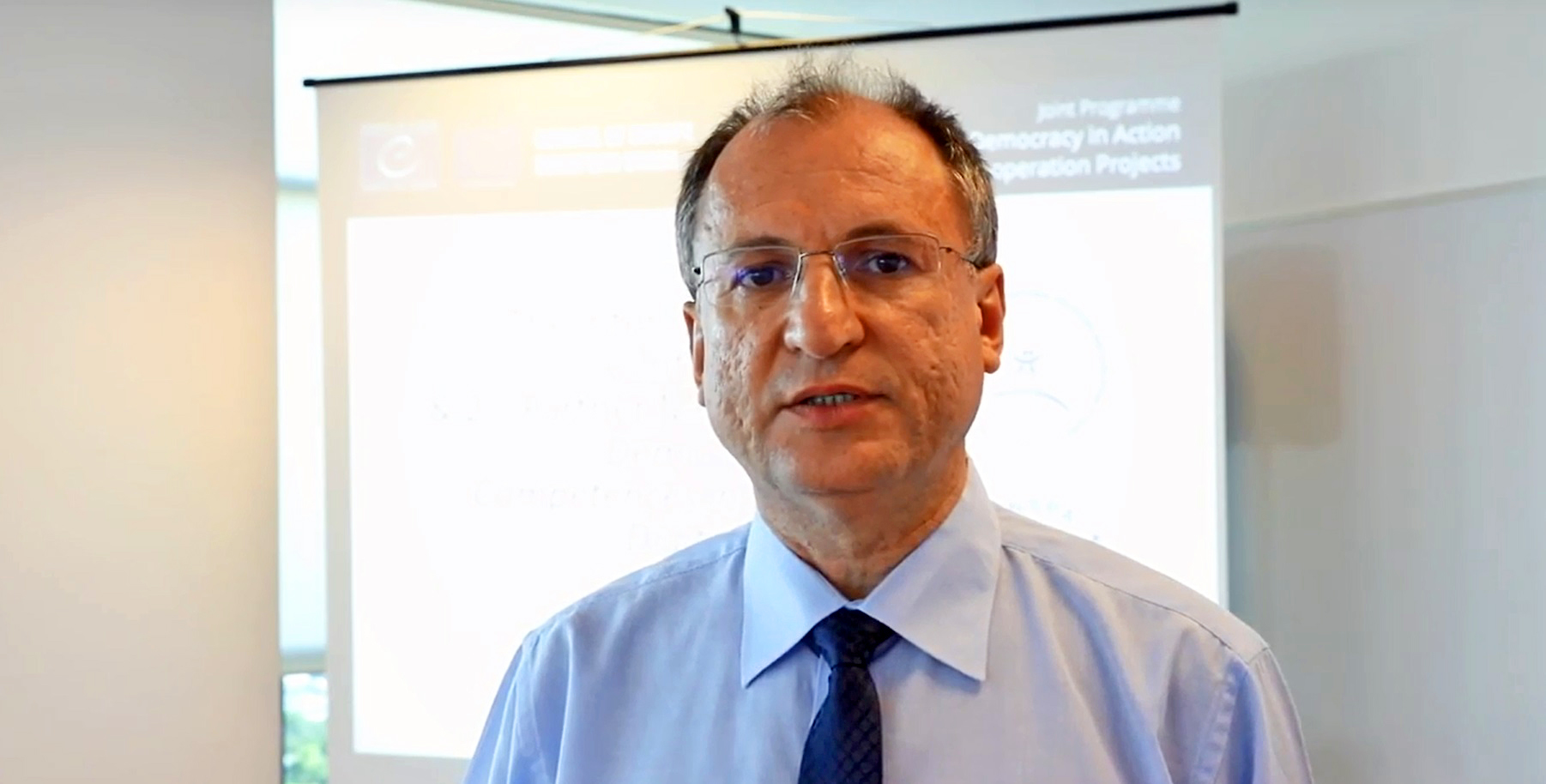Interview with Calin Rus, Council of Europe expert

Our first expert is Calin Rus, the Director of the Intercultural Institute of Timisoara, Romania who has been involved in several Council of Europe projects as an expert. Notably, he participated in the Group of Experts who developed the Council of Europe Reference Framework of Competences for Democratic Culture, which identifies 20 competences for democratic culture.
We asked him several questions, linked to the challenges of the education sector in view of the coronavirus crisis. Two of the questions related directly to the Council of Europe work in the field of education and its relevance in the current situation.
Below you may read a written excerpt regarding the relevance of Council of Europe standards and tools in the current crisis, or listen to the full interview.
Which competences are of particular relevance in the current situation?
Indeed, I had the opportunity to be part of the group of experts that developed the Reference Framework of Competences for Democratic Culture. Already during the development process we could see how much the work that we were doing is closely related to challenges that are facing our societies. During the time of the development of the Reference Framework, a few years ago, it was a lot about radicalisation, about extremism, about populism, but of course, now it is about addressing a pandemic.
Indeed, I think that many of the elements of the model of competences for democratic culture are especially relevant in the current situation. First of all, the values. This situation brings to the fore the importance of values in our societies and especially of valuing human rights and human dignity. All the measures that are taken in this period are about protecting basic fundamental rights. They also imply restrictions and limitations in accessing certain rights. It is when we are confronted with the lack of access to certain rights that we come to understand better how important the rights are for us and for the society. It is also very important that the measures that are being taken now are based on the idea that our European societies are built on the value of human dignity and that all that is being done should consider this [value], it is done for the purpose of promoting and respecting human dignity and human rights.
Of course, we are also seeing these days the importance of valuing democracy, justice, equality, fairness and the rule of law. Even the exceptional measures that must be taken in these circumstances have to comply with legal requirements, they are subject to constitutional limitations and they have to ensure the equal treatment of all citizens. And, perhaps more than in a situation of normality, in this period the debate about fairness is more evident – it is about the fair distribution of resources, including the resources associated with the fight against the pandemic, and also in relation to the support provided to those who are more vulnerable and who need specific support.
Besides the values, several of the attitudes of the competences for democratic culture are especially relevant for the current context. The attitude of respect is obviously very important, and maybe even more so the attitude of responsibility. We are all responsible for ourselves, for our own safety, but we are also aware, maybe to a larger extent than usually, of the responsibility that we have to protect the others. And that is why by staying at home, by limiting our contacts with the others, by using the social distancing approach, we actually take responsibility and contribute to limiting the effect of this pandemic.
This is also very closely associated with civic mindedness. What we do and what we refrain from doing in this period is also related to what we believe is good for the community in general, for the local community, for the citizens of our country, for the humanity in general. And we have to consider the general interest in making decisions and in the way we behave in this period. It is also important to refer to self-efficacy - the idea that we can actually do something, that we do not need just to be passive, that there are many things that we can do in this situation for ourselves, for our family members and for others, providing support, contributing to different voluntary groups and taking action when it is necessary at our local level. We can in all these ways use this attitude of self-efficacy and make sure that we actually have an impact and we contribute to improving the situation.
But maybe the attitude that is usually disregarded in many other situations and becomes a very important aspect these days is the tolerance of ambiguity. There is of course a much higher degree of uncertainty and ambiguity that surrounds us these days and in this period it is very important to accept, first of all, that we do not know how fast the situation will improve. But we still have to continue to do our work, we cannot just block and wait for things to clarify, and this is where the use of tolerance of ambiguity is extremely important.
Of course, there are many skills in the model of competences for democratic culture that are especially important in the current situation. I would say that they are equally important for young people in order to continue their learning, but they are also important beyond that. Autonomous learning skills are extremely important to continue the learning when the schools are closed, but also for organising the learning about the current situation and the way in which it evolves. We need to make sure that we access the appropriate sources of information and that we organise our learning process in order to understand what is happening.
There is, of course, beyond that, a set of skills that are part of the model of competences for democratic culture that are especially important in order to process and manage the information flow about the current events. We need listening skills, we need communication skills, we need to use, where possible, our multilingual skills. Even more, we need our critical thinking skills in order to deconstruct messages that we receive, to single out disinformation, propaganda and manipulation at a time when we are bombarded with messages such as ones claiming that the virus does not exist or that are exaggeratingly describing the situation as close to apocalypse or that promote a large range of conspiracy theories.
And to cope with this situation, with the fact that we have to be confined in our homes and with little contact with other people, we also need to use our cooperation skills and our conflict management skills when we interact online, but also when we interact directly with the members of our families and with our neighbours.
What can the Council of Europe offer in response to the crisis in the field of education?
With regards to what the Council of Europe can do in this period to support the response to the current pandemic in the field of education, I would like to mention four aspects. The first is related to the promotion of the rich range of education materials that have been already produced along the years by the Council of Europe. I can confirm from my own practical experience of working with teachers these days that many of the materials that have been produced by the Council of Europe and that address topics that are relevant for the current context are considered as very useful by teachers. They should be further promoted, used and adapted for the current distance learning.
Another element and maybe also a lesson that the Council of Europe should learn from the current context is related to the use and the provision of more resources that are not only available on-line, but can be used in on-line and blended learning. It is very important that teachers have the chance to use further materials form Council of Europe in on-line education activities that will be developed in the future. Because now that many people got much more used to online learning, my opinion is that the access and the use of online learning will increase in the future, beyond the current limitations.
One such example, and this is my third point, that is available online is the Teacher Self-Reflection Tool related to the Reference Framework of Competences for Democratic Culture, which is currently under development and under testing. Teachers who understand English, as for now the pilot version of the Tool is only available in English, can use the time that they have available these weeks to contribute to the piloting of this tool. The tool is expected to provide a very important support to teachers across Europe, first of all to support them to reflect on their own competences, but also to support them to address with their pupils such issues as student voice, the understanding of the media, promotion of wellbeing in education, addressing bullying and discrimination, or teaching controversial issues.
And, finally, I think that, in this period, the resources developed within the projects that the Council of Europe is implementing in various countries, sometimes in partnership with the European Union or with the EEA/Norway Grants, could be, to the largest extent possible, directed towards supporting teachers and schools in order to contribute to compensating the negative effects of the school closures.
The Corona crisis has put a serious strain on the education systems in different countries. What, in your opinion, are the main challenges?
What solutions, in your opinion, can the education systems offer to overcome the crisis?
You are one of the authors of the Council of Europe Reference Framework of Competences for Democratic Culture, which identifies 20 competences for democratic culture.
a) Which competences are of particular relevance in the current situation?
b) What can the Council of Europe offer in response to the crisis in the field of education?



